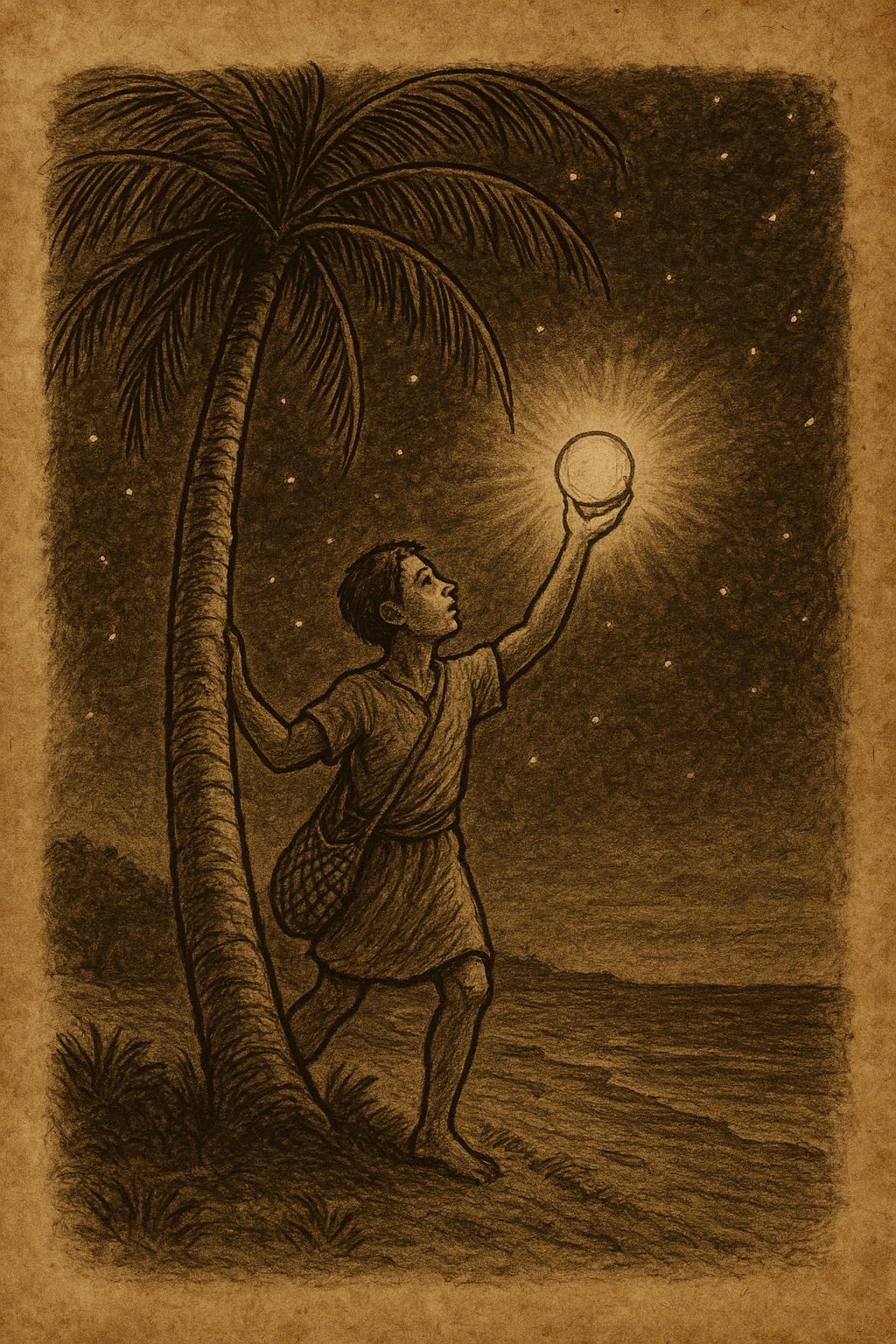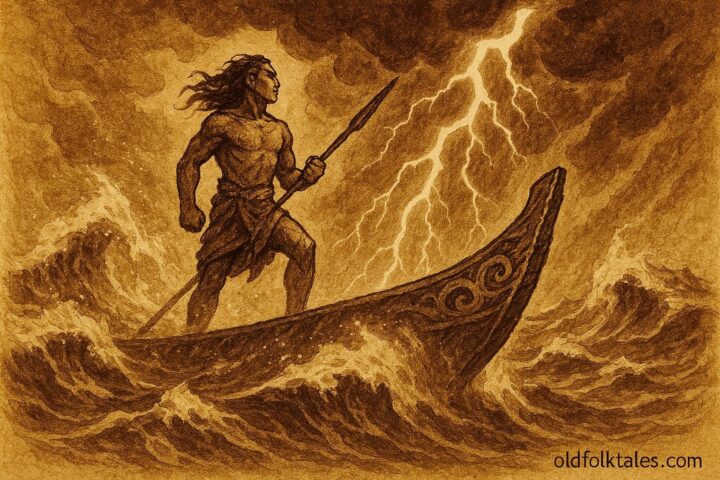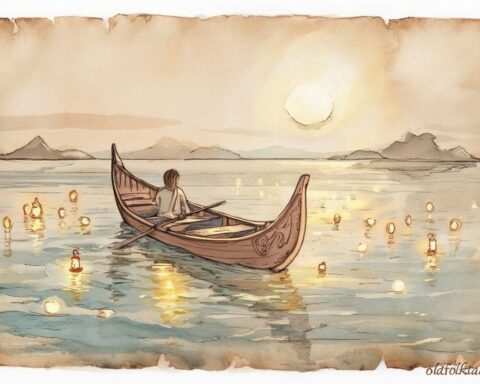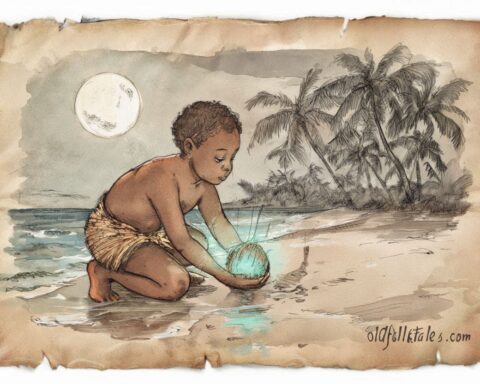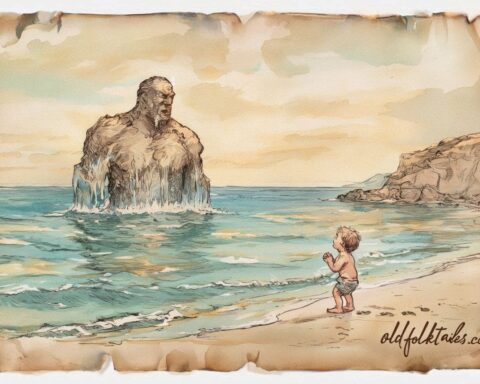In the time before the moon existed, when the world was divided sharply between the blazing day and the impenetrable night, the people of the Trobriand Islands lived half their lives in fear. When the sun descended beyond the western horizon, painting the sky briefly in shades of fire before vanishing completely, darkness fell upon the land like a heavy blanket smothering all beneath it.
The stars did their best. They scattered themselves across the black vault of heaven, twinkling bravely, doing what they could to pierce the gloom. But their light was faint and distant, like candle flames seen from far away. By their weak glow, people could barely distinguish path from jungle, friend from stranger, safety from danger. The night belonged to shadows and uncertainty, and people huddled close to their cooking fires, waiting anxiously for dawn’s return.
In one of the island villages lived a young man named Tamoa. He was a fisherman, as his father had been and his grandfather before those men who understood the moods of the sea, who could read the weather in the color of the water and predict the movements of fish by the flight of seabirds. Tamoa was skilled with hook and line, patient with nets, and unafraid of the ocean’s vast power.
But even Tamoa, brave as he was on the water during daylight, found the starlit nights troubling. The darkness made fishing nearly impossible, and it forced his people to end their work when the sun set, limiting what they could accomplish and gather.
One evening, as the last red light was draining from the western sky and the stars were just beginning to appear like salt scattered on dark cloth, Tamoa decided to try fishing in the shallows near shore. Perhaps, he thought, he might catch something by feel and instinct, even if he couldn’t see clearly.
He waded into the warm water, feeling it lap around his legs, and cast his line into the darkness. The sea whispered and sighed around him, speaking in its ancient, wordless language. Above, the stars grew brighter as the sky deepened to true black, but their light barely reached the water’s surface.
Tamoa waited with the patience his father had taught him. Time passed he couldn’t say how much, for time moves strangely in darkness. Then suddenly, he felt a tug on his line. Not the frantic pull of a fighting fish, but something steady and heavy, as if he had snagged something resting on the ocean floor.
He pulled carefully, hand over hand, drawing up his line. The weight felt strange neither the writhing resistance of a living fish nor the dead pull of seaweed or coral. When his catch finally broke the surface, Tamoa gasped.
Hanging from his hook was a shell but not an ordinary shell. It was perfectly round and smooth, larger than any coconut shell he had ever seen, and it glowed with a soft, inner light that seemed to pulse gently like a heartbeat. The luminescence was pale and silvery, casting just enough illumination that Tamoa could see his own hands clearly for the first time since sunset.
His heart pounding with a mixture of excitement and fear, Tamoa carefully unhooked the shell and cradled it in his arms. It was warm to the touch, almost alive, and its light grew slightly brighter as he held it. The glow was beautiful not harsh like the sun, but gentle and soothing, turning the water around him into liquid silver.
Tamoa waded back to shore, holding his mysterious prize carefully. As he walked through his village toward his home, people emerged from their huts, drawn by the strange light. They gathered around him, murmuring in wonder and fear, their faces painted silver by the shell’s radiance.
“What is it?” they asked. “Where did you find such a thing?”
“From the sea,” Tamoa replied, his voice hushed with awe. “It came to me from the depths.”
He carried the shell into his home, intending to study it more closely, perhaps to keep it as a treasure that would light his dwelling through the dark nights. But as he set it down, he heard something that made his blood run cold.
The shell spoke.
Its voice was neither male nor female, neither loud nor soft it simply existed in his mind, clear as thought but unmistakably not his own. “Do not hide me away,” the shell whispered, its tone carrying neither threat nor pleading, but simple statement of fact. “Lift me to the sky. That is where I belong.”
Tamoa stood frozen, his rational mind warring with what he had just experienced. Shells did not speak. Yet he had heard it as clearly as he had ever heard anything. His hands trembled as he picked up the shell again, and again the voice came: “Lift me to the sky.”
Fear and curiosity battled within him, but curiosity won. Perhaps it was the fisherman’s instinct to explore the unknown, or perhaps it was destiny. Whatever the reason, Tamoa walked outside, where his villagers still gathered, and approached the tallest palm tree at the village edge.
The tree stretched high into the darkness, its fronds rustling softly in the night breeze. Tamoa had climbed it many times to harvest coconuts he knew every rough patch of bark, every good handhold. But he had never climbed it at night.
With the glowing shell secured carefully in a net bag slung across his back, Tamoa began to climb. The shell’s light helped him see the trunk clearly, and he ascended steadily, hand over hand, his bare feet finding purchase on the familiar bark. His people watched from below, their upturned faces glowing faintly.
Higher and higher Tamoa climbed, until the voices below faded and he was alone with the whisper of wind and the rustle of palm fronds. The stars seemed closer now, and he could see the dark shapes of other islands in the distance, silhouetted against the star-scattered sky.
When he reached the crown of the palm, where the great fronds spread out like fingers, Tamoa carefully removed the shell from his bag. It pulsed in his hands, growing warmer, its light intensifying. Taking a deep breath, he raised it high above his head, holding it up toward the stars as if making an offering to the heavens themselves.
The moment the shell reached its highest point, everything changed.
Light exploded from the shell not gradually, but all at once, like the sun bursting forth at dawn. The soft silver glow became a brilliant radiance that flooded across the entire island, turning night into something new not day, but something between, a luminous twilight that painted everything in shades of pearl and silver.
The sea below reflected the light in a million dancing sparkles. The jungle canopy, invisible moments before, now showed every leaf clearly. The village houses stood out in sharp relief, and Tamoa could see his people below, their faces tilted upward, their mouths open in amazement.
“The darkness is gone!” they cried in wonder and joy. “We can see! The night has light!”
But Tamoa, still clinging to the palm tree’s crown with one hand while holding the blazing shell aloft with the other, was staring directly at the source of all that radiance. The light grew stronger and stronger, brighter and brighter, until it became painful like looking at the sun itself. His eyes began to burn, and tears streamed down his face.
He squeezed his eyes shut, but the brightness penetrated even his closed eyelids. Unable to bear it any longer, his hand opened involuntarily, and the shell fell from his grasp.
But it did not fall downward.
Instead, as Tamoa blinked away the burning tears and forced his eyes open to see what had happened, he watched in amazement as the shell floated upward. It rose gently but steadily, as if held by invisible hands, drifting higher and higher into the night sky. The light it cast remained strong but gradually became less painful, reaching that perfect balance bright enough to illuminate the world below, soft enough not to hurt the eyes that looked upon it.
Up and up the shell floated, growing smaller but no less luminous, until it reached the heights where only stars had lived before. And there it stopped, hanging suspended in the heavens, a perfect sphere of silver-white light that bathed the entire island and beyond in its gentle radiance.
Tamoa slowly climbed down from the palm, his legs shaking from more than just physical exertion. When he reached the ground, his people surrounded him, touching him with awe, as if he had become something more than human through his actions.
From that night forward, the shell remained in the sky, and the people gave it a name: the moon. It hung there faithfully, night after night, its light waxing and waning in cycles that would become as familiar as breathing, but never disappearing completely. Never again would the night be utterly dark. Never again would people have to cower in complete blackness, helpless and afraid.
The moon lit paths through the jungle so hunters could track game. It silvered the ocean so fishermen could work their nets after sunset. It illuminated the faces of lovers meeting in secret, children playing evening games, elders telling stories around fires that no longer had to burn as the sole source of light.
And though Tamoa’s eyes had been burned by staring at the shell’s full radiance leaving them slightly weaker than before, sensitive to bright light he never regretted what had happened. He had given the world a gift more precious than any fish he could ever catch he had transformed the night from enemy to friend.
The people of the Trobriand Islands honored Tamoa for the rest of his life, and long after he died, they continued to tell his story. When children looked up at the moon and asked where it came from, the elders would point upward and say:
“That is the shell from the sea, caught by the brave fisherman Tamoa. He lifted it high when it asked, even though it hurt him to do so. He gave us light for the darkness, and the moon has watched over us ever since.”
And on nights when the moon is full and bright, they say you can still see the shape of a coconut shell in its round face a reminder that even the most ordinary-seeming things might hold extraordinary power, if only we have the courage to lift them high.
Explore tales of ancestral spirits and island creation that connect people to the land and sea
The Moral Lesson
This Trobriand Island legend teaches us about courage, sacrifice, and obedience to higher purposes. Tamoa could have kept the magical shell for himself, using its light selfishly, but he listened when it told him its true purpose. Though he suffered burned eyes from his bravery, his willingness to endure personal cost brought lasting benefit to all humanity. The story reminds us that sometimes we must sacrifice our own comfort to fulfill a greater destiny, and that acts of courage even when they come with a price can illuminate the world for generations to come.
Knowledge Check
Q1: What was life like on the Trobriand Islands before Tamoa found the magical shell?
A: Before the moon existed, the Trobriand Islands people lived in complete darkness every night, with only faint starlight to guide them. The darkness made fishing nearly impossible after sunset, forced people to end their work when the sun went down, and created an atmosphere of fear and uncertainty. People huddled near cooking fires and could barely distinguish paths from jungle or safety from danger, making nighttime dangerous and limiting what communities could accomplish.
Q2: Who was Tamoa and how did he discover the magical coconut shell?
A: Tamoa was a young fisherman from the Trobriand Islands who came from a family of skilled fishermen. One evening, he decided to try fishing in the shallows despite the darkness. When he felt an unusual tug on his line not like a fighting fish but steady and heavy he pulled up a perfectly round, smooth shell that glowed with a soft, pulsing silver light. This was no ordinary shell, but a magical object that would transform the night sky forever.
Q3: What did the magical shell tell Tamoa to do, and how did he respond?
A: The shell spoke to Tamoa in a voice that existed clearly in his mind, saying “Do not hide me away. Lift me to the sky. That is where I belong.” Though frightened by a speaking shell, Tamoa’s curiosity and courage overcame his fear. He carried the shell to the tallest palm tree in the village and climbed to its crown, where he raised the shell high above his head toward the stars, obeying its mysterious command.
Q4: What happened when Tamoa held the shell up to the sky?
A: When Tamoa raised the shell toward the heavens, it suddenly burst into brilliant light that flooded across the entire island, illuminating everything in silver radiance. The light grew so intense that it burned Tamoa’s eyes, causing him great pain. Unable to bear the brightness any longer, he dropped the shell but instead of falling, it floated upward on its own, rising into the sky where it became the moon, providing gentle light for all the world below.
Q5: What personal sacrifice did Tamoa make, and why is it significant in this legend?
A: Tamoa suffered burned eyes from staring directly at the shell’s full radiance when it exploded with light, leaving his vision permanently weakened and sensitive to bright light. This sacrifice is significant because it shows that bringing light to the world came at a personal cost Tamoa endured pain so that all humanity could benefit from the moon’s illumination. His willingness to suffer for the greater good makes him a heroic figure in Trobriand culture.
Q6: What cultural significance does the moon hold for the Trobriand Islands people based on this origin story?
A: According to this legend, the moon represents a divine gift obtained through human courage and sacrifice. The Trobriand people see the moon as the transformed coconut shell from the sea, still visible in its round shape, that their ancestor Tamoa bravely lifted to the sky. The moon’s cycles became essential for navigation, fishing, hunting, and daily life, transforming night from a time of fear into one of productive activity. The story reminds them that extraordinary gifts often require personal sacrifice and obedience to higher purposes.
Source: Adapted from Trobriand Islands mythology documented by anthropologist Bronisław Malinowski in Myth in Primitive Psychology and related ethnographic works (1922-1926).
Cultural Origin: Trobriand Islands, Milne Bay Province, Papua New Guinea (Melanesian oral tradition)
